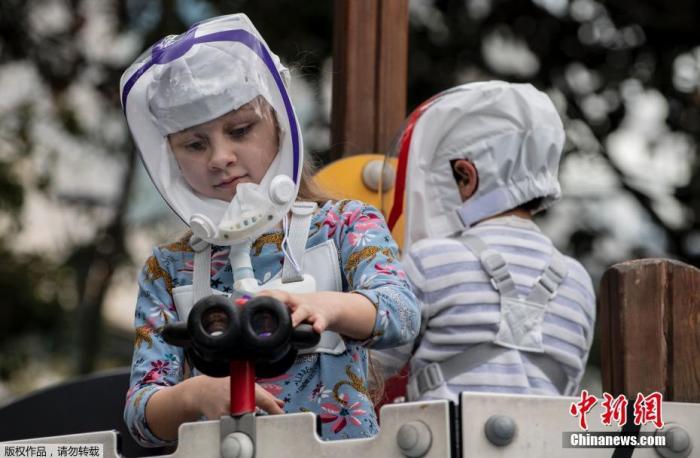China News Service, November 20 (Bian Lei) November 20 is World Children’s Day and the anniversary of the signing of the Convention on the Rights of the Child.
But when the new crown epidemic is still raging in many countries and the lives and psychology of children are being affected, how should we hold up a blue sky for children?
The picture shows Ghana lighting up blue lights to celebrate World Children's Day.
(Photo source: screenshot of official UNICEF social networking site)
[When the blue light turns on again...]
On this day, many parts of the world once again lit up the blue lights symbolizing child-friendliness to celebrate the arrival of World Children’s Day.
The landmark dragon bridge in Danang, Vietnam, 30 landmark buildings and monuments in Pakistan, the garden in Ghana...
About 66 years ago, the United Nations established International Children’s Day, which was later renamed World Children’s Day in 2017.
On November 20, 1989, the "Convention on the Rights of the Child" was passed.
In the 31 years since then, children’s lives have improved.
According to the data on the UNICEF website:
-Nearly half of the world's children each year receive life-saving vaccines provided by UNICEF and others;
—— In 2019, 17 million out-of-school children received pre-school, primary and secondary education;
- In the humanitarian emergency in 2019, UNICEF diagnosed and treated more than 4 million children with severe acute malnutrition;
...
"This year's World Children's Day, we call on governments, partners and the private sector to listen to children's voices and put their demands first." UNICEF Executive Director Henrietta Forr pointed out.
Fore also issued an appeal, “When we reimagine the future and look to the world after the epidemic, we must give priority to children.”
Data map: A team of Colombian engineers has designed a bubble helmet that looks like a helmet used by astronauts to prevent infection with the new crown virus.
[Don't let them become the "lost generation" due to the epidemic! 】
The new crown epidemic is the biggest crisis of our time and has caused many devastating consequences, as UN Secretary General Guterres pointed out at the opening ceremony of the 2020 World Health Summit on October 25.
Among them, children bear the brunt of the impact.
On the eve of World Children’s Day, UNICEF released the first report that comprehensively outlines the impact of the epidemic on children, pointing out the threats children face: the direct consequences of diseases, the interruption of basic services, increasing poverty and inequality, and calling for caution Children become the "lost generation" due to the epidemic.
"A rumor about the new crown virus disease suggests that children hardly get infected, but that is not the case." Fore said, "Children can also get sick and spread the virus. This is just the tip of the iceberg of the epidemic."
In the report, UNICEF, based on the latest questionnaire survey data from 140 countries, came up with worrying results:
——As of November, 572 million students in 30 countries were affected by school closures, accounting for 33% of the total number of students worldwide;
——With the severe interruption of related services, it is estimated that about 2 million children will die and 200,000 babies will still be born in the next 12 months;
——In 2020, there will be an additional 6 to 7 million children under the age of 5 who will suffer from wasting or acute malnutrition. The number will increase by 14%, which is equivalent to an increase of 10,000 child deaths every month...
“Disruptions in key services and soaring poverty rates pose the greatest threat to children. The longer the crisis lasts, the deeper the impact on children’s education, health, nutrition and well-being. The future of an entire generation is at stake.” Fu Er warned.
On November 20, 1989, the United Nations General Assembly passed the Convention on the Rights of the Child.
In the middle of the front row is the late UNICEF Goodwill Ambassador Audrey Hepburn.
Image source: UN website image/John Isaac
[Stick to our promise to children, "We will never stop"]
When children are in crisis due to the epidemic, it is very important to review the United Nations Convention on the Rights of the Child and stick to its commitment to children as always.
"All children have all these rights, regardless of their status, where they live, what language they speak, what religion they believe in, and regardless of their thinking, appearance, gender, and whether they are disabled, poor or rich, family origin or What is your family’s beliefs. No child should be treated unfairly for any reason."
On November 20, 1989, world leaders passed the United Nations "Convention on the Rights of the Child," making it "the most widely ratified human rights treaty to date", making a historic commitment to children around the world.
As of October 2015, the number of contracting states has reached 196.
Right now, when another World Children’s Day arrives, people urgently need to promote and celebrate children’s rights while creating a friendly environment for children around the world through dialogue and action.
As UNICEF wrote on its website: "Save children's lives, defend their rights, and help them realize their potential. We never stop."

